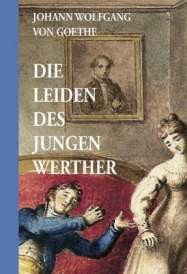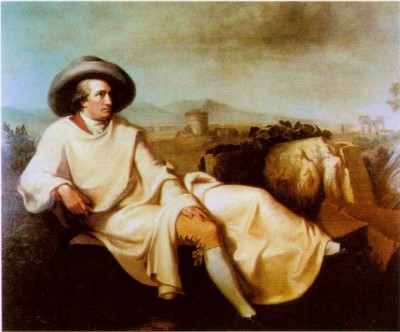Johann Wolfgang von Goethe (1749-1832)
Pretend there is no h in his name; in fact, contemporaries
often wrote the author's name as Goete,
and pronounce it gew
- tuh
1749 Born in Frankfurt, then part of the Holy Roman Empire
(now Germany)
1768 Begins Law studies in Leipzig
1773 Gothic Play Götz von
Berlichingen
1774 Epistolary novel, The
Sorrows
of Young Werther, which causes Europeans to imitate the
character's dress and final decision, is an example of the pre-Romantic
Storm and Stress (Sturm und Drang)
movement
1776 Begins civil service in the cultural capital of Weimar
1782 His royal patron, Duke Carl August of Weimar, ennobles him (now
von Goethe)
1787 Tragedy Iphigenie auf Tauris
1789 "Heidenröslein"
published
1790 First Italian trip; Torquato
Tasso
1795 Roman Elegies
1797 Hermann und Dorothea
1798 Bildungsroman (educational novel, novel of maturation or
coming of age) Wilhelm Meister’s
Apprenticeship Years
1808 Faust, Part I
1810 Work on optics, Zur Farbenlehre;
Other
scientific
interests
incl.
biology,
anatomy
1811-14 Composes autobiography, Dichtung
und
Wahrheit (Poetics and Truth)
1832 Faust Part II; dies in
Weimar
1832-Present: Globally, Goethe is revered as the most famous German
author and ‘great writer’
Key words and terms:
Pantheism = Goethe's belief
that everything (pan) represents God (theism). This means that every
living thing can embody a divine aspect.
romantic irony: Traditional
irony is "a
figure of speech in which the intended meaning is the opposite of that
expressed by the words used; usually taking the form of sarcasm or
ridicule in which laudatory expressions are used to imply condemnation
or contempt" (OED). Ironic
statements contain a gap between what is said, and what is understood.
An ex. of verbal irony might be: "Oh, the weather's just great today." Yet the weather is
cold, raining, and dark. The discrepancy between what is said, and what
is meant, alerts the audience to how the speaker really feels (the
weather is just awful) while drawing attention to what is wished for,
and what is actually happening.
According
to Bennett, books like Werther
exemplify romantic irony.
Whereas traditional irony undercuts one
perspective, in romantic irony, two perspectives continue to exist
simultaneously, although the veracity or trustworthiness of the
perspective may be questioned. Bennett calls this a dual or
bifocal view of German Romantic writers (77).
Works Cited
Bennett, B. "Goethe's Werther: Double Perspective and the Game of
Life." GLQ 53.1 (Jan. 1980):
64-81.
"Irony." Oxford English Dictionary.
2nd
ed.
Clarendon:
Oxford
UP, 1989.
<http://dictionary.oed.com> Online.



